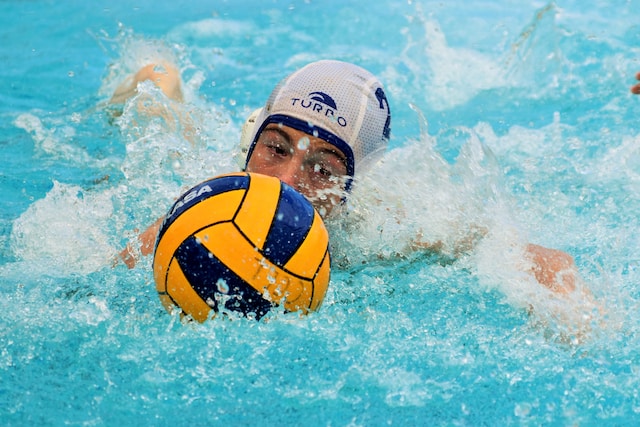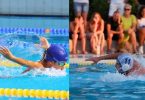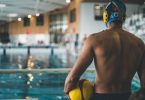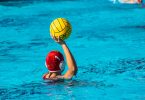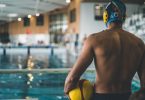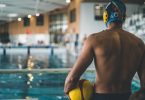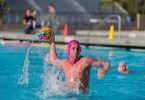Water polo is a physically demanding sport that combines swimming, ball handling, and strategic planning. It’s a game that requires a unique set of skills and abilities from its players, including speed, agility, and strength. But, how good at swimming do you need to be to play water polo?
It’s a question that many people have asked, and in this article, we’ll explore the answer. We’ll take a close look at the swimming skills needed to play water polo, as well as the other skills and abilities required to be a successful player. So, if you’re curious about whether or not you have what it takes to play water polo, then keep reading!
While swimming well is important, specific training is also required to play water polo successfully. Players must learn how to pass and shoot the ball accurately, understand the rules of the game, and develop tactics for both offense and defense. However, none of these skills can be developed without first having a solid foundation in swimming ability.
Basic Swimming Skills
If you want to play water polo, you need to have a good foundation in swimming. While you don’t have to be an Olympic-level swimmer, you do need to be comfortable in the water and able to swim with speed and endurance. Here are some basic swimming skills you should master before playing water polo:
Treading Water
Treading water is a crucial skill for water polo players. It allows you to stay afloat while waiting for a pass or defending against an opponent. To tread water, keep your head above the surface and move your arms and legs in a circular motion. You can also use the eggbeater kick, which is a scissor-like motion that allows you to keep your upper body still while moving your legs.
Swimming Strokes
Water polo players primarily use freestyle, breaststroke, and backstroke during a game. Freestyle is the fastest stroke and is used for sprinting and swimming long distances. Breaststroke is slower but allows you to conserve energy and is often used when defending. Backstroke is used for defensive purposes, allowing you to see the entire pool while swimming.
It’s important to practice proper technique for each stroke to avoid injury and swim efficiently. For example, in freestyle, you should keep your head down and look at the bottom of the pool, while in breaststroke, you should keep your arms and legs close to your body to reduce drag.
Overall, having strong swimming skills is essential for playing water polo. Practice treading water and swimming strokes to improve your speed, endurance, and technique.
Water Polo Skills
To play water polo, you need to have a certain level of swimming ability. However, swimming is just one part of the game. Water polo requires a unique set of skills, including passing and receiving the ball, shooting and scoring, and defensive skills. Let’s take a closer look at each of these skills.
Passing and Receiving the Ball
Passing and receiving the ball is a crucial skill in water polo. To pass the ball effectively, you need to be able to tread water while keeping your head up and looking for open teammates. You should also be able to pass the ball accurately and quickly, using both hands.
To receive the ball, you need to be able to position yourself correctly, using your body to shield the ball from defenders. You should also be able to catch the ball with both hands and quickly transition into a shooting or passing motion.
Shooting and Scoring
Shooting and scoring is the ultimate goal of water polo. To be a successful shooter, you need to have a quick release and be able to shoot accurately from a variety of angles and distances. You should also be able to shoot while under pressure from defenders.
Scoring in water polo requires a combination of skill and strategy. You need to be able to read the defense, anticipate their movements, and find open spaces to shoot the ball into the goal.
Defensive Skills
Defensive skills are just as important as offensive skills in water polo. To be an effective defender, you need to be able to tread water while keeping your body in a defensive position. You should also be able to anticipate the movements of the offensive players and use your body to block shots and passes.
Other defensive skills include stealing the ball from offensive players, intercepting passes, and preventing opponents from getting into scoring position.
Overall, water polo requires a unique set of skills that go beyond basic swimming ability. To be a successful water polo player, you need to master passing and receiving the ball, shooting and scoring, and defensive skills.
Physical Fitness
If you want to play water polo, you need to be in great physical condition. This sport requires a combination of endurance, strength, and agility to be successful. Here are some key areas to focus on:
Endurance
Water polo is a demanding sport that requires players to swim constantly for extended periods. You need to be able to swim at a moderate pace for at least 30 minutes without getting tired. To improve your endurance, try swimming laps at your local pool or participating in other aerobic activities like running or cycling.
Strength
Water polo players need to be strong to handle the physical demands of the sport. You need to be able to push and pull other players, as well as throw the ball with force. To build strength, incorporate weightlifting into your training regimen. Focus on exercises that target your upper body, such as bench presses, pull-ups, and shoulder presses.
Agility
Water polo requires quick movements and changes in direction. You need to be able to move fluidly in the water and change direction on a dime. To improve your agility, try incorporating plyometric exercises into your training. These exercises focus on explosive movements and can help improve your reaction time and quickness.
Conclusion
In conclusion, playing water polo requires a certain level of swimming ability. While you don’t have to be an Olympic-level swimmer to play, you should be comfortable swimming at least 300 yards nonstop.
This will allow you to keep up with the pace of the game and participate fully in all aspects of play. Additionally, having strong swimming skills can give you a competitive advantage in water polo.
The ability to swim fast in the freestyle stroke can be a valuable asset for breakaways, loose balls, and swim-offs. Developing your swimming technique and endurance can help you become a more well-rounded and effective water polo player.
Overall, while swimming ability is important for playing water polo, it is not the only factor that determines success in the sport. Other skills such as coordination, game sense, and strength are also crucial for playing at a high level. With dedication and practice, anyone can improve their swimming ability and become a skilled water polo player.

